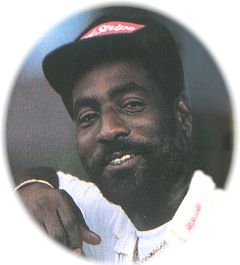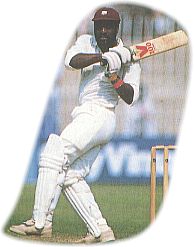The greatest of his time
My son William, aged nine, was reading an article in The Times about the (1981) Brixton riots, and when he finished I tentatively asked him how he felt about the (British) National Front's view that black people were somehow inferior. "Pathetic," he replied, "none of them can have seen Viv Richards at the crease." - Former British MP Jeffrey Archer.
INTERNATIONAL cricket during Viv Richards's time was remarkable for one thing: the number of top-class fast bowlers who played the game. You can start with Dennis Lillee and Andy Roberts and then the names just keep coming: Jeff Thomson Mike Holding, Joel Garner, Bob Willis, Geoff Lawson, Malcolm Marshall, Richard Hadlee, Imran Khan, Craig McDermott, Wasim Akram, ad infinitum. In fact, between 1976 and 1986 there were probably more fine fast bowlers in the game than at any previous time in the game's history.
 There were several players during that time who never overcame the fear of fast bowling and simply capitulated. Glenn Turner and Zaheer Abbas are two well-known names which immediately come to mind. The fact that Richards stood out in an era like this is, thus, all the more praiseworthy. He took the fast men on; his attitude helped no end. And, barring the one instance in 1975-76, when Lillee and Thomson left the Windies shell-shocked, he generally won.
There were several players during that time who never overcame the fear of fast bowling and simply capitulated. Glenn Turner and Zaheer Abbas are two well-known names which immediately come to mind. The fact that Richards stood out in an era like this is, thus, all the more praiseworthy. He took the fast men on; his attitude helped no end. And, barring the one instance in 1975-76, when Lillee and Thomson left the Windies shell-shocked, he generally won.
His desire to establish himself as the boss early on in an innings sometimes got him into trouble - at times he went after everything and brought about his own dismissal. At others, he tried to overdo things a bit and got out early. But that was the way he played the fast bowlers. And he could seriously screw up some paceman's mind, to the extent where the fast man was broken and could not bowl properly for the rest of the game and sometimes even a whole series.
It was after Richards had established himself as the best batsman in the world in 1976 that his tussle with the fast men intensified. Every paceman knew that if he got Richards early, then a psychological battle would have been won against the team as a whole. Every man in the West Indies team was in no doubt as to who was the best in their ranks and if King Viv was finding a bowler tough to handle, then every other guy would build up all sorts of fears in his mind enough to throttle himself at the crease.
Richards no doubt understood this very well. It fitted in very well with the way he loved to play the game. He enjoyed a special position in the team and knew it. His deliberate swagger to the crease,  the sinister way in which he chewed gum and those famous stares were all part of his psychological armour. There was the way he tried to hit a fast bowler over his head. And the way he fixed the bowler with a look as he ran past the stumps at the other end.
the sinister way in which he chewed gum and those famous stares were all part of his psychological armour. There was the way he tried to hit a fast bowler over his head. And the way he fixed the bowler with a look as he ran past the stumps at the other end.
Rodney Hogg was one of the sufferers over the years. In the 1979-80 series, his confidence was destroyed and he limped from the field with a back injury in the Melbourne Test after being mauled by Richards. This happened after Hogg hit Richards a painful blow in the face; the next ball went soaring into the stands for six and the massacre continued until Hogg left the field with figures of none for 59 from six overs. He did not play international cricket for almost a year after that.
Bob Willis can testify to equally savage treatment. Richards took him on during the West Indies tour of England in 1980. Willis had almost seen England through to a win in the first Test and was beginning to be talked about as a serious strike force. Richards struck during the third Test; he reserved practically all his aggression for Willis and took 53 of his 65 and 12 of the 13 boundaries he hit, off the tall Englishman. The next encounter between the two was four years later and in that series Richards played a major role in ensuring that Willis's last 85 overs in Test cricket brought him a return of six wickets for 367 runs.
Thus, Richards achieved more than just the simple goal of scoring runs for his team. He often won the mental battle for the entire team. His very presence sometimes served to intimidate opponents. At times things went horribly wrong - witness the way he needlessly threw away his wicket during the World Cup final against India in 1983, at a time when he was well and truly on top of the bowling. Had he stayed, there is no doubt that West Indies would have won that game. But then he wouldn't have been Viv Richards.